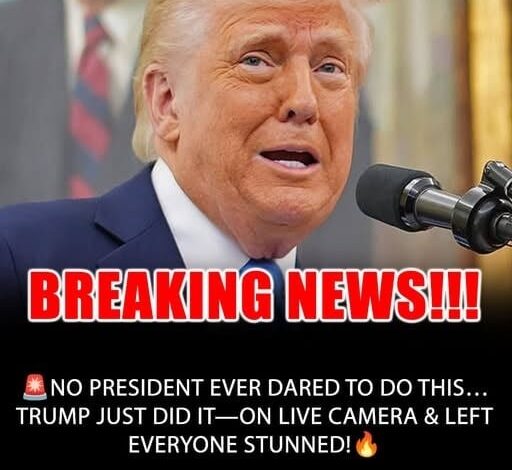Donald Trump’s latest public appearance has reignited an old and dangerous debate about the limits of presidential power and the role of a free press in American democracy. During a tense press briefing this week, Trump told reporters, “Changes are coming,” referring not to policy or foreign relations, but to how the media operates. The remark, delivered in his characteristic confrontational tone, sent shockwaves through the political and journalistic world.
The statement came after Trump faced harsh criticism for his handling of a military strike involving Iran that reportedly went awry. Instead of addressing the controversy head-on, the former president turned his ire toward the journalists in the room, accusing them of “unfair coverage” and “distorting the truth.” He didn’t stop there. “The press has been out of control,” he said, pausing before adding, “That’s going to change.” The line was brief but chilling — a direct threat to one of the most fundamental institutions of American democracy.
Reporters in the room immediately exchanged uneasy glances. While Trump has a long history of attacking the press — labeling major outlets like CNN and The New York Times as “fake news” and calling journalists “enemies of the people” during his first term — this moment felt different. It wasn’t just rhetoric. It sounded like intent.
Press freedom groups and constitutional scholars reacted within hours. The Committee to Protect Journalists called the statement “a dangerous escalation,” warning that even a hint of government interference in media operations “crosses a line that separates democracy from authoritarianism.” The American Civil Liberties Union echoed the sentiment, stating, “No president — past or present — has the authority to control or intimidate the press. This kind of language belongs in dictatorships, not in the United States.”
Behind the scenes, some advisers reportedly tried to soften Trump’s message, telling outlets like Politico that the former president was referring to “media reform initiatives” aimed at reducing “bias in corporate newsrooms.” But few were convinced. Trump’s long record of hostility toward journalists, combined with his renewed political momentum, has many worried about what those “changes” might actually mean.
The incident followed a week of public scrutiny over a failed U.S. airstrike order in Iran that intelligence officials say was based on flawed data. The strike, called off at the last minute, sparked widespread debate over decision-making inside Trump’s foreign policy team. Rather than addressing the issue or admitting missteps, Trump deflected, casting blame on “dishonest media coverage” and hinting that reporters were undermining national security by publishing leaked information.
The exchange mirrors patterns seen throughout Trump’s career — when challenged, he attacks. During his presidency, he openly clashed with networks, revoked press credentials, and even suggested altering libel laws to make it easier to sue journalists. Those statements, while largely symbolic, signaled a shift in how political power could be leveraged against public accountability.
This latest threat goes further. Trump’s tone carried a mix of defiance and calculation, suggesting that if reelected, he might seek to reshape the relationship between the government and the media — possibly through new legal or regulatory mechanisms. Some analysts worry that such moves could include restricting press access, controlling public information channels, or encouraging lawsuits against critical outlets.
The White House Correspondents’ Association issued a statement condemning the remarks, emphasizing that “the freedom of the press is not negotiable.” They noted that while every administration faces scrutiny, no modern president has openly threatened to alter the press system itself. “To attack the press is to attack the public’s right to know,” the group’s president said. “It’s that simple.”
Political commentators across the spectrum interpreted Trump’s remarks as part of a broader strategy: rallying his base by vilifying institutions that challenge him. For decades, his brand has thrived on confrontation — with political rivals, law enforcement, and especially the media. By casting journalists as villains, he fuels a narrative that paints himself as the victim of elite manipulation and censorship.
However, the consequences extend far beyond rhetoric. Experts warn that such statements can embolden violence and mistrust. In recent years, reporters have faced increasing harassment, both online and in person, often tied to anti-media sentiment fanned by political leaders. “Words like these have real-world effects,” said Columbia journalism professor Emily Greene. “When a former president tells millions of followers that the press is the enemy, it erodes the foundation of factual discourse that democracy depends on.”
For now, Trump’s campaign has not announced any formal policy proposals related to media reform, but insiders suggest that his team is exploring ways to “limit misinformation,” a term critics fear could be used to justify censorship of unfavorable coverage. If that effort gains traction, it could represent the most serious challenge to the First Amendment in modern U.S. history.
What makes this moment so striking isn’t just what Trump said — it’s how he said it. Calmly, directly, and with the conviction of someone who knows the weight of his words. “Changes are coming” could mean many things. But for a man who has long blurred the line between political theater and real power, the possibility that he intends to act on that threat cannot be dismissed.
No other president — not Nixon, not Reagan, not even during wartime — has spoken so bluntly about reshaping or disciplining the press. That’s why this moment stands out. It’s not about media bias or political spin. It’s about power — who holds it, who questions it, and who dares to tell the truth about it.
Whether Trump’s declaration was a passing outburst or a preview of a larger plan remains to be seen. But one thing is certain: democracy cannot function without a free press, and any attempt to silence it — even under the guise of reform — marks a step toward something darker. As one veteran reporter put it afterward, “We’ve heard these words before in other countries. They never end well.”


